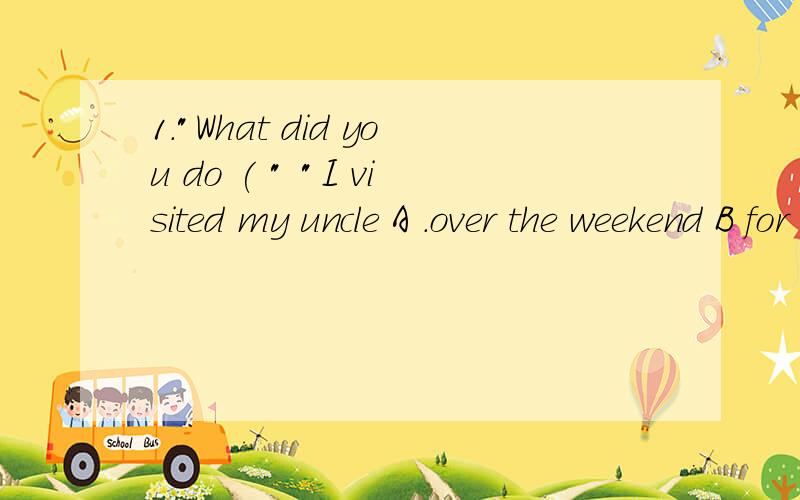1."What did you do ( " "I visited my uncle A .over the weekend B for the weekend C.on weekendD at the weekend2.It's quite a long ( ) to the post office .A street B way C time D block3.连词成句 Mr relaxing Smith vacation a have to very plans4.A:Do
来源:学生作业帮助网 编辑:作业帮 时间:2024/07/11 11:09:45

1."What did you do ( " "I visited my uncle A .over the weekend B for the weekend C.on weekendD at the weekend2.It's quite a long ( ) to the post office .A street B way C time D block3.连词成句 Mr relaxing Smith vacation a have to very plans4.A:Do
1."What did you do ( " "I visited my uncle A .over the weekend B for the weekend C.on weekend
D at the weekend
2.It's quite a long ( ) to the post office .A street B way C time D block
3.连词成句 Mr relaxing Smith vacation a have to very plans
4.A:Don't you like walking to school
B:No,I don't.It takes ( ) 填空不限词数
1."What did you do ( " "I visited my uncle A .over the weekend B for the weekend C.on weekendD at the weekend2.It's quite a long ( ) to the post office .A street B way C time D block3.连词成句 Mr relaxing Smith vacation a have to very plans4.A:Do
1.A .over the weekend 上周末
你上周末干什么了?
at the weekend =on (the) weekend 泛指"在周末",同一般现在时连用.
for the weekend 表示"度周末"
2.B way
quite a long way to ..离...相当远(表距离)
quite a long time 相当长的时间.用在此句不恰当.
句意:这儿离邮局还相当远.
3.Mr Smith plans to have a very relaxing vacation .
史密斯先生计划过一个轻松的假期.
4.It takes ( a long time to walk to school )
句意:步行去上学要用很长时间.